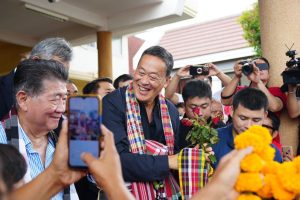The Association of Southeast Asian Nations (ASEAN) is in crisis and it appears that key foreign leaders, despite the twin challenges of Myanmar and the South China Sea, are passing on this week’s ASEAN Summit and related meetings in Jakarta. First, U.S President Joe Biden decided to skip the gathering of Southeast Asian states for the G-20 Summit hosted by India and a visit to Vietnam, and Chinese President Xi Jinping will be represented by Premier Li Qiang. But for Thailand, a founding member of the 10-member grouping, the absence of new Prime Minister Srettha Thavisin represents more than just absenteeism. It is the first foreign policy mistake of his days-old administration.
According to the Thai government, Srettha’s absence was related to an appearance with his Cabinet before King Vajiralongkorn, followed by a Parliamentary address. Instead, Thailand has been represented by the new Foreign Minister Dr. Panpree Phahitthanukorn, who on the surface, is an upgrade from the problematic junta-era tenure of Don Pramudwinai, as when he was a key advisor to Pheu Thai, he was quick to criticize the previous government’s less-than transparent attempts at diplomacy. However, now faced with the realities of an awkward coalition government, it is unlikely that Thailand will make the policy adjustments needed to address ASEAN’s crisis of relevance amid its failure to resolve the ongoing conflict in Myanmar.
There are many reasons for this. First, Srettha is attempting to smooth over relations with Thailand’s military, which has maintained its long-standing policy of “constructive engagement” with the junta’s State Administration Council (SAC) and coup leader Senior Gen. Min Aung Hlaing. Shortly after being sworn in, the Thai prime minister met with the military to “bridge the divide” between the public and the armed forces, one that widened during Prayut Chan-o-cha’s almost ten years at the helm. Srettha was quoted as saying the military “has done many good things” – a gesture of goodwill – but he also has to deal with the incoming group of military leaders handpicked by Prayut during his final days in office.
That internal diplomacy, however, costs Thailand the opportunity to undertake foreign policy initiatives that would set it back in line with the rest of the international community. In the past, the foreign policy of Srettha’s Pheu Thai Party was much more cooperative, often exploring avenues to improve bilateral ties with ASEAN neighbors and firm up its status in regional groupings like ACMECS. A more pragmatic Pheu Thai is likely to pass on the opportunity to distinguish itself from the junta-era position and join the other four founding members of ASEAN in establishing a firmer line toward the regime in Naypyidaw. Some of this resistance likely comes from reservations over comments made by leader Pita Limjaroenrat of the Move Forward Party, which is now in opposition despite winning May’s general election, who promised a reversal of Thailand’s Myanmar policy. That prompted a firm response from the junta – and likely rattled Thai elites who have vested interests in maintaining the diplomatic status quo.
Because of internal diplomacy and compromise with the more military-friendly Bhumjaithai and Palang Pracharath parties, the twin humanitarian and refugee crises along the country’s border with Myanmar will continue, both for embattled Rohingya Muslims from Rakhine State and anti-junta forces seeking refuge in the Kingdom. This also means that the era of non-transparent “cowboy diplomacy,” as Cambodia undertook during its ASEAN chairmanship in 2022, will continue and low-profile meetings between Thai and Burmese military officers will remain commonplace.
Despite many public statements expressing Thailand’s confidence in ASEAN as a “cornerstone” of its foreign policy, its efforts to promote peace have been lackluster and have contributed to the bloc’s current existential predicament. Part of ASEAN’s crisis can be blamed on a lack of attention paid to it by the United States, which sent Vice President Kamala Harris to this week’s summit in President Joe Biden’s place, but also punted on the APEC Summit hosted last year in Thailand.
However, Bangkok cannot afford to let ASEAN weaken as an institution. While its credentials as a forum for diplomacy have been questioned, its economic community is too big and too important to fail, as the bloc requires substantial relations with the European Union, the United States, and the U.K, all of which have imposed sanctions against the military junta in Myanmar. As these critical partners become less inclined to engage with ASEAN as a bloc rather than as individual states, it leaves the institution even more vulnerable to an aggressive and assertive Beijing.
Through deliberate inaction, Srettha is hastening ASEAN’s demise and pushing it closer to irrelevance.

































